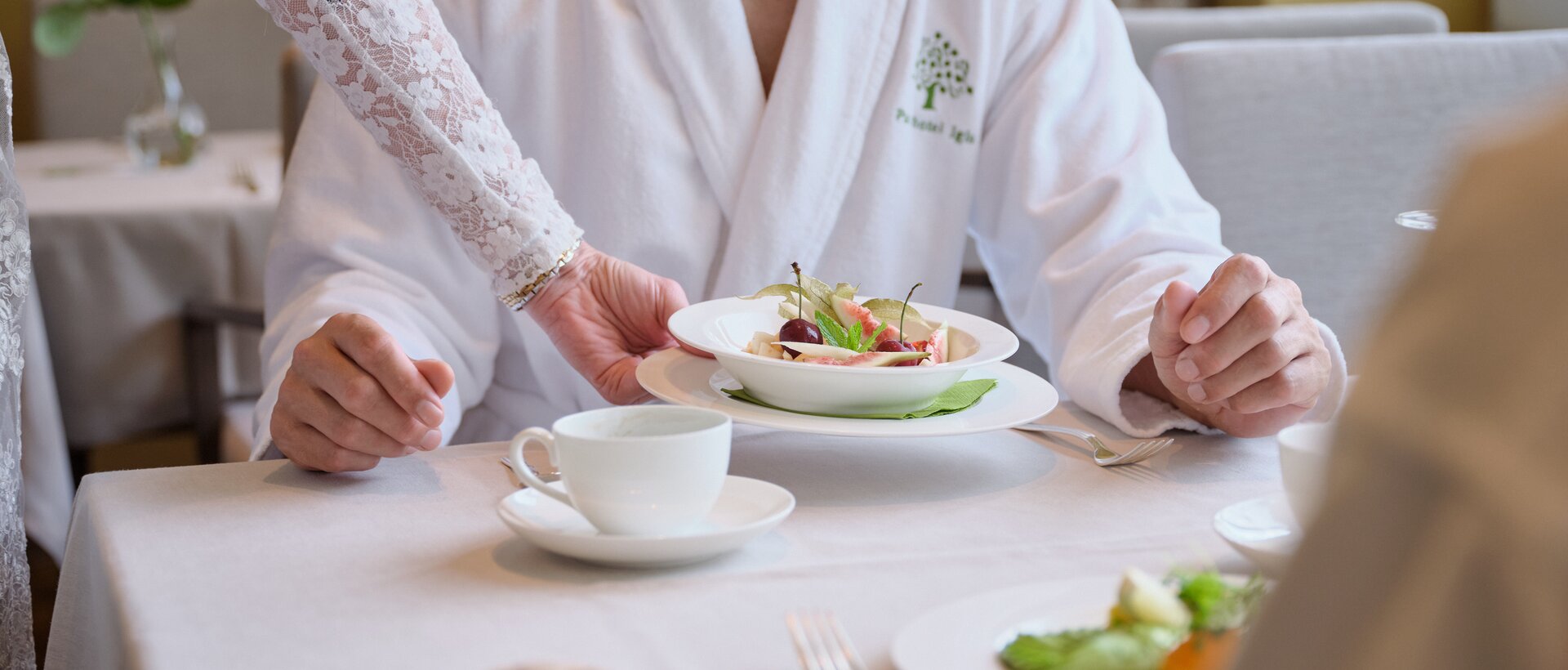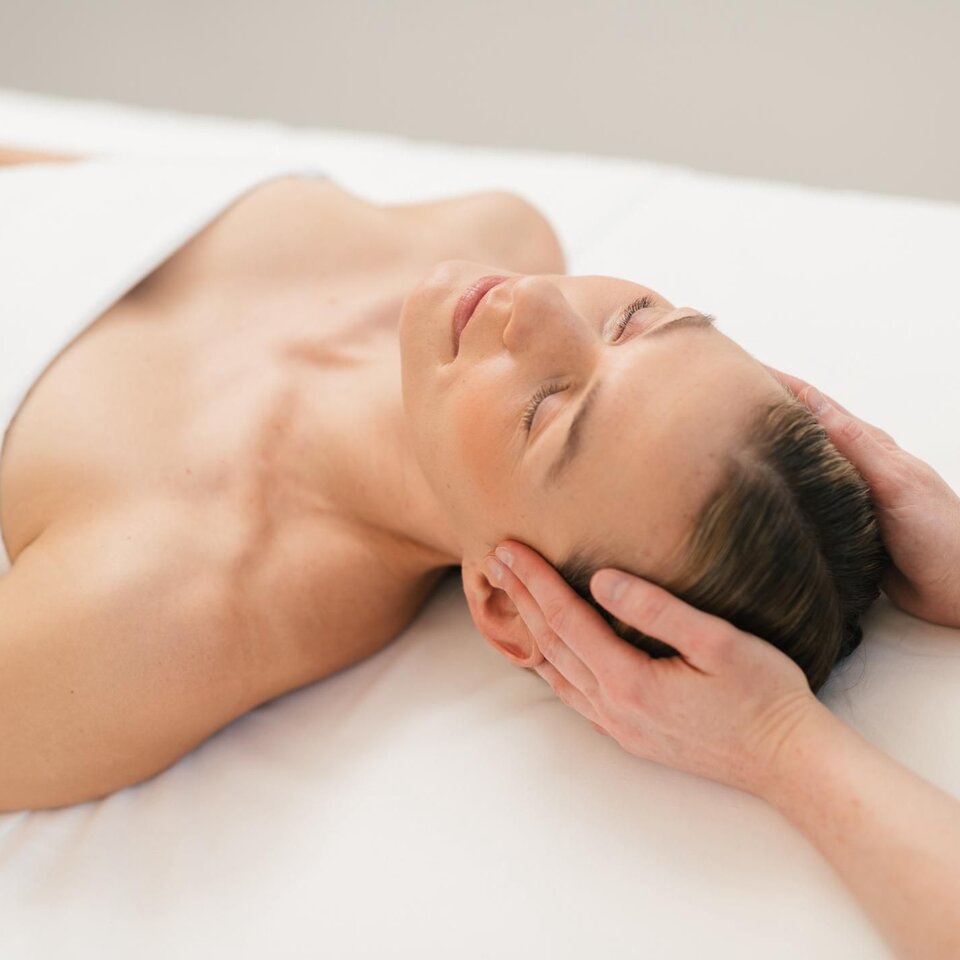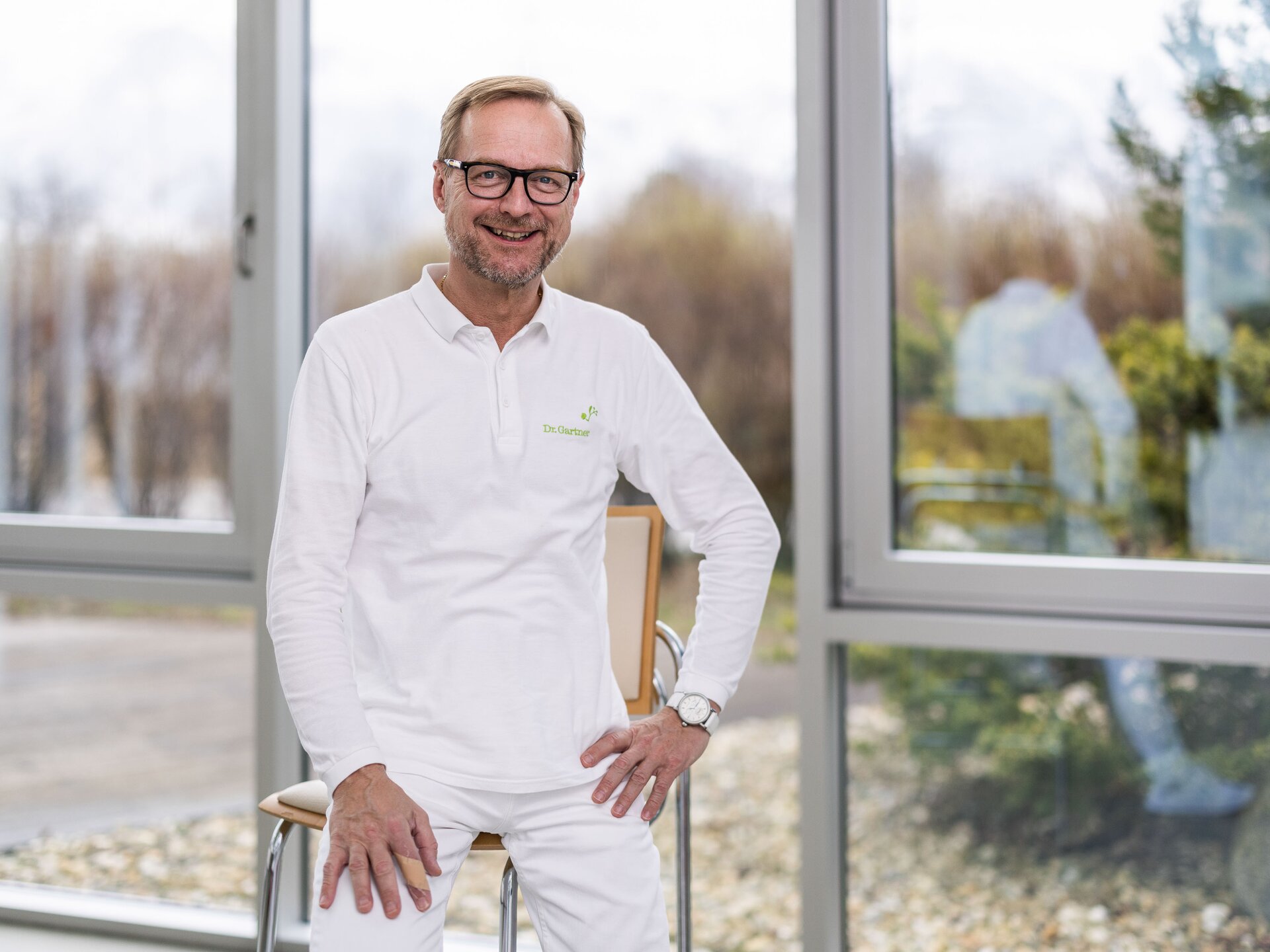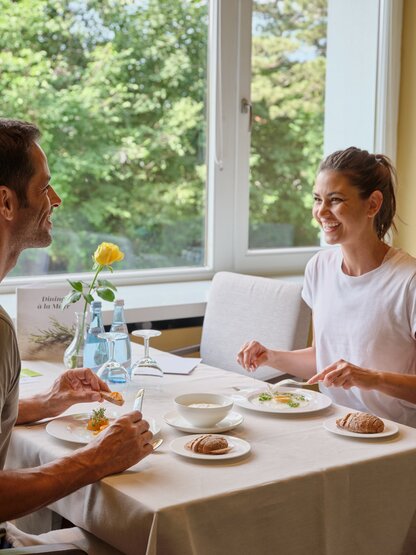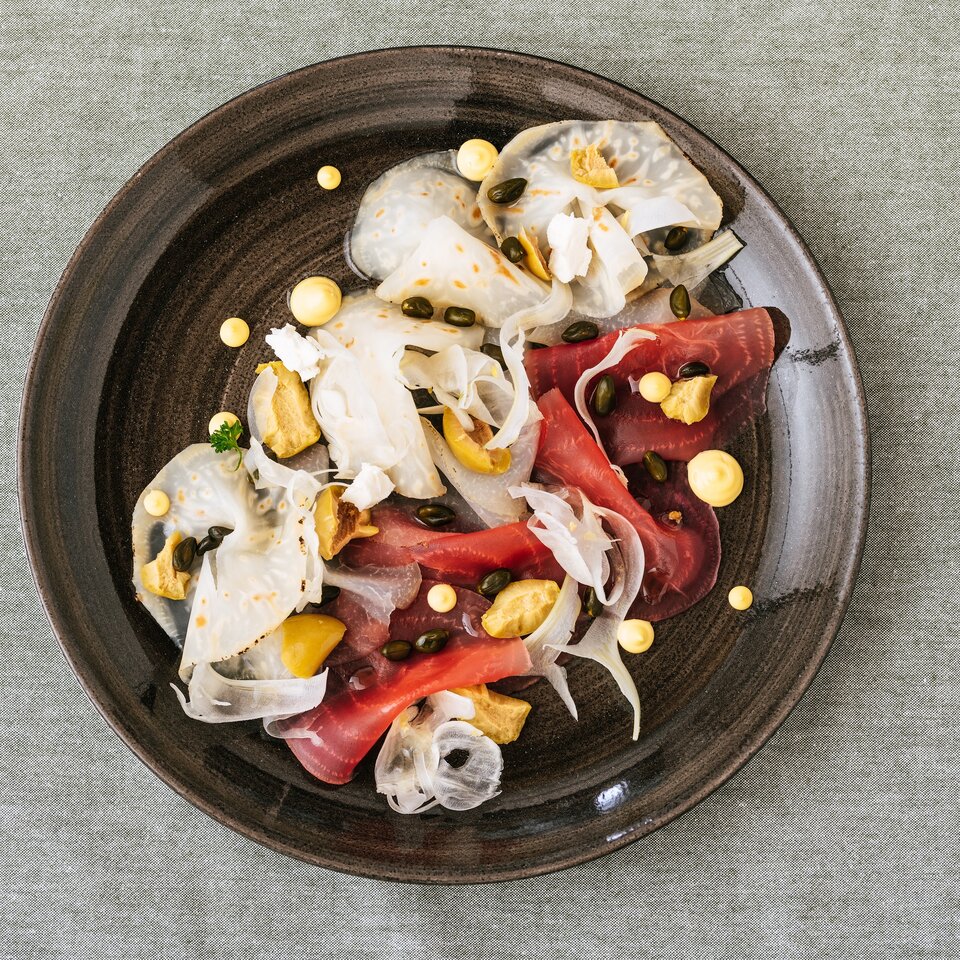Reset for body & mind
You are what you eat. But is this age-old saying really true? Dr Peter Gartner, Medical Director at Park Igls, talks to Dr Melanie Robertson, a clinical psychologist, neuropsychologist and health psychologist, about the benefits of the Mayr Cure and how our diet influences our mental health.
Ist Schokolade tatsächlich nervenstärkend?
Does our diet have an effect on how stressed or relaxed we are? And is is true that chocolate can help us to calm down?
Dr Gartner: There is a Swiss study that shows that the flavonoids contained in dark chocolate do indeed reduce the amount of stress hormones released into the body. In my opinion, the question of how and when you eat is more important than the question of what you eat. For me, the process of salivating, chewing slowly and deliberately, pre-digesting, preparing the food in the mouth before it enters the intestines, are all important elements that play a key role in the Mayr Cure. That, for me, is the real meaning of soul food.
Dr Robertson: When it comes to the question of how our diet affects our mental state, what we eat does also play a role. For some years now there has been a great deal of research carried out into the connection between diet and mental health and the influence of diet on mood. The connection runs both ways: what we eat affects how we feel and, vice versa, how we feel is influenced by what we have eaten. Poor nutrition therefore has an impact on our mood. Consuming large amounts of sugar, for example, has a destabilising effect. There is a brief high followed by a rapid drop in blood sugar levels and a craving for more. So that means there really are foods that are better for our mood than others.
Dr Gartner: Sugar has been shown to be more addictive than cocaine.
Dr Robertson: A study carried out in the US showed that it doesn't actually matter whether a product tastes of sugar. Savoury foods containing a large amount of sugar such as white bread also activate the area of the brain responsible for addiction. What's more, sugar is added to many products without us realising it – mustard, for example, contains lots of added sugar. When you buy something it's always worth taking a close look at the list of ingredients. What we also know ready meals contain large amounts of sugar – and that as a society we are eating more and more of these processed products.
Dr Gartner: Sugar is the enemy number one when it comes to our diet. Eating large amounts of sugar causes blood sugar levels to spike and then fall away quickly. Ultimately that means we become susceptible to illness and premature aging. Cornbread also triggers a what we call a sugar spike: blood sugar levels rise quickly, then rapidly fall back below the starting point and you get the munchies. That's why when you go out for a meal you will often be served bread to start. The restaurant owner wants you to be hungry at the end of your meal and order a dessert! If you start with vegetables, you will remain full for longer and won't feel like having dessert.
Is is true that...
... the body is not always able to accurately judge how much insuline it needs and this can lead to a sugar low?
Dr Gartner: When something tastes very sweet, this triggers a kind of alarm bell in the pancreas and the body sends an undetermined amount of insulin into the blood in the assumption that more sugar is about to follow. It follows the same principle as the classical conditioning demonstrated by Palov's dogs. When the body sends too much insulin according to the "better safe than sorry" principle, the concentration of sugar in the blood drops back below the initial level. The faster blood sugar levels rise, the more the blood sugar falls back below the baseline. This does not happen if blood sugar levels rise slowly and steadily.
There is a clear connection between diet, tension and relaxation. In this context, the axis between the gut and the brain plays an essential role. Bacteria secrete substances that eventually enter the brain and tell it what to do. We often do not actually crave what we think we want to eat, but instead our bacteria tell us what we should be craving by releasing certain metabolic end products. They send out substances which tell the brain that it should want this or that. This gut-brain axis is something we need to learn much more about in the coming years.
Achieving deep relaxation
What are the basics of Modern Mayr Medicine and what happens to the body during a Mayr Cure?
Dr Gartner: The first principle of the Mayr Cure is to detoxify the body by drinking large amounts of water – guests aim to drink one litre of water for every 20 kilos of body weight. This should only be done under the supervision of a medical professional. Drinking water dissolves old toxins, which then enter the bloodstream and are transported out of the body via bile or urine. Bitter substances aid this detoxification process. The second principle of the Mayr Cure is to reduce strain on the digestive system and minimise the formation of new toxins. Particularly important in this context is pre-digestion, a process discovered by Dr Mayr. It involves long, thorough chewing of each mouthful with the aim of shifting a significant part of the work normally done by the gut to the mouth. This, in turn, reduces the strain placed on the gut. Chewing for a long time and generating large amounts of saliva in the mouth takes much of the digestive strain off the intestines. Ultimately, this gives the stomach and wider digestive system the oportunity to rest and recover.
Dr Gartner: The Mayr Cure is suitable for all people suffering from illnesses or conditions either directly or indirectly associated with the digestive system – from problems related to the oesophagus and stomach (reflux and gastritis) to all chronic inflammatory bowel diseases including those affecting accompanying organs of the digestive tract (gall bladder, liver, pancreas, stone formation, blockages, inflammations, etc.). The list is long! There is not a single chronic illness that cannot be alleviated or even cured with Modern Mayr Medicine. An important focus of the Mayr Cure is the connection between the health of the gut and the overall health of the body. Here at the Park Igls Medical Spa Resort in Tyrol we have had many, many patients who have benefited from the Mayr Cure.
Dr Gartner: To be honest, we don't have many patients who need to be motivated. In fact, most of the time I have to persuade patients to be a little less ambitious and to start off slowly. Most of them want to fast a little harder than I recommend and also want to remain on this strict dietary level for a day or two longer at the end. They are motivated because they have managed to keep going without feeling hungry. The secret is that they have learnt to get by with less food by eating properly. They experience a feeling of fullness while eating.
Dr Gartner: When it comes to preparing for a Mayr Cure, we recommend a step-by-step approach. That means in the week before you come to Park Igls you should drink no alcohol and eat as little meat as possible, ideally none. We also recommend eating a smaller dinner than normal or skipping dinner completely. Last but not least, try to drink more water than normal between meals.
Dr Gartner: It is important to bear in mind that there will always be differences between your time at Park Igls and your everyday routine. At Park Igls, guests have the chance to focus 100% on rest, relaxation and recovery. When it comes to daily life, try not to be too strict with yourself. It's already an achievement if you manage to implement a few things from your time at Park Igls. One thing you can definitely transfer from our hotel to your home is what we call the "cutlery trick" – place your cutlery aside while chewing and you will end up chewing each mouthful for longer. Tricks like these, which you learn during your stay at Park Igls, can make a big difference.
This connection between diet and mood has been the subject of much research in the last few years. It has been shown that what we eat does indeed have an effect on how we feel. The connection runs both ways: what we eat affects how we feel and, vice versa, how we feel is influenced by what we have eaten.
People suffering from depression should avoid eating large amounts of sugar as this can have a destabilising effect. Foodstuffs rich in omega-3 fatty acids, magnesium and an amino acid called tryptophan, on the other hand, support the production of serotonin, which can alleviate symptoms of depression.
Poor nutrition has an impact on our mood. Eating large amounts of sugary foods or foods with a high glycaemic index can have a destabilising effect on mental health. In these cases there is a short high followed by a sharp drop in blood sugar levels and a craving for more.
Foods rich in omega-3 fatty acids, magnesium and the amino acid tryptophan support the production of serotonin, a hormone in the body which improves our mood. Most important of all, however, is a healthy gut – after all, a large proportion of the body's serotonin is produced in the mucous membrane lining the gut.
Details on Modern Mayr Medicine and its benefits for your health can be found on our website.
